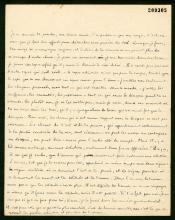BRACERS Record Detail for 19311
To access the original letter, email the Russell Archives.
"Je ne saurais te peindre, ma douce amie, l'impatience qui me rouge."
There is no salutation or signature. The false identities of Mirabeau and Buzot are not included.
There is a transcription, document .052415, record 99876. Although the date of May has been assigned to this document, it possibly was written in early June.
Letter 13
BR TO CONSTANCE MALLESON, [EARLY JUNE 1918]
BRACERS 19311. AL. McMaster
Previous Brixton letter, BRACERS 46917; next letter, BRACERS 57177
Edited by K. Blackwell, A. Bone, N. Griffin and S. Turcon
<Brixton Prison>1
<early June 1918>2
Je ne saurais te peindre, ma douce amie, l’impatience qui me ronge. C’est en vain que je fais des efforts pour détacher mes pensées de toi. Quoique je fasse, ton image m’accompagne toujours, et le désir de la réunion ne me permet plus de m’occuper d’autre chose. Je pense au moment où je me trouverai dans tes bras — je pense au repos infini qu’il y aura à dormir à côté de toi. Il n’existe pas pour moi d’autre repos qui soit réel — le repos ordinaire n’est que pour le corps, tandis que le repos que tu me donnes est un repos aussi pour l’âme — j’oublie non seulement les chagrins personels,a mais tout ce qui est terrible dans le monde — j’oublie les souffrances, les cruautés, les petitesses — tout ce qui cause le désespoir quand tu es absente. Ou plutôt non, je ne les oublie pas, mais je vois, dans ces moments où tu me tiens dans les bras, qu’il y a quelque chose de beau qui est aussi fort que le désespoir. Pour moi, les choses qui n’ont aucun rapport avec le désespoir ne sont pas sérieuses. Les choses de l’art et de la pensée, qui appartiennent exclusivement à la partie civilisée de la vie, sont sérieuses: on peut les mettre en contrepoisb au désespoir, on peut dire: voici pour l’autre côté du compte. Mais il n’y a là aucun mélange, aucune solution, seulement deux forces opposées. Il n’y a, à ce que je sache, que l’amour qui puisse vraiment faire entrevoir une solution. L’amour, tel que je le ressens pour toi, appartient en même temps aux deux régions: la région civilisée où se trouvent l’art et la pensée, et la région primitive où se trouvent la mort et la solitude et la terreur. Dans l’amour, la terreur cesse parce que la solitude n’existe plus. Il est difficile de trouver un amour réciproque si intime qu’il fasse cesser la solitude, mais il est possible. Tu l’as fait pour moi. Je ne sais pas si je l’ai fait pour toi; si non, je le ferai dans les années qui viendront. Et c’est pour cela que ce qui est le plus essentiel, c’est de dormir ensemble, car c’est là que se nourrit la partie instinctive et primitive de l’amour.
<Translation:>
I could not portray for you, my sweet friend, the impatience which gnaws at me. It’s in vain that I try to detach my thoughts from you. No matter what I try, your image accompanies me always, and the desire of reunion no longer allows me to think of anything else. I think of the moment when I shall find myself in your arms — I think of the infinite rest I shall have sleeping next to you. There isn’t for me any other rest as real — ordinary rest is only for the body, while the rest you give me is a rest for the soul — I forget not only my personal sorrows, but also all that is terrible in the world — I forget suffering, cruelty, pettiness — all that causes despair when you are absent. Or rather, that I don’t forget, but I see in these moments, when you hold me in your arms, that there is something beautiful that is as strong as despair. For me, things that have no relationship with despair aren’t serious. Things of art and thought, which belong exclusively to the civilized part of life, are serious: one can put them in contrast to despair, one can say: this is for the other side of the ledger. But there is no mix, no solution there, only two opposing forces. As far as I know, only love can really provide a glimpse of a solution. Love, such that I feel for you, comes at the same time from two regions: the civilized region where art and thought can be found, and the primitive region where death and loneliness and terror are found. In love, terror ceases because loneliness no longer exists. It’s difficult to find reciprocal love so intimate that it stops loneliness, but it is possible. You did that for me. I don’t know if I did that for you; if not, I shall do it in the years to come. And it’s for that reason that sleeping together is the most essential, because it’s sleeping together that nourishes the instinctive and primitive part of love.
- 1
[document] The document was edited from the unaddressed, unsigned original in BR’s handwriting in the Malleson papers in the Russell Archives. He filled only the ruled side of a sheet of thin laid paper and folded it once. There are no initials of approval on it.
- 2
[date] Editorially dated early June 1918 because, in the absence of pretence that it was an historical letter, it likely followed the French letters that did pretend to come from the French Revolution; and because of the emphasis on despair, which BR took up a few days later in his letter-statement for Clifford Allen (Letter 18).

